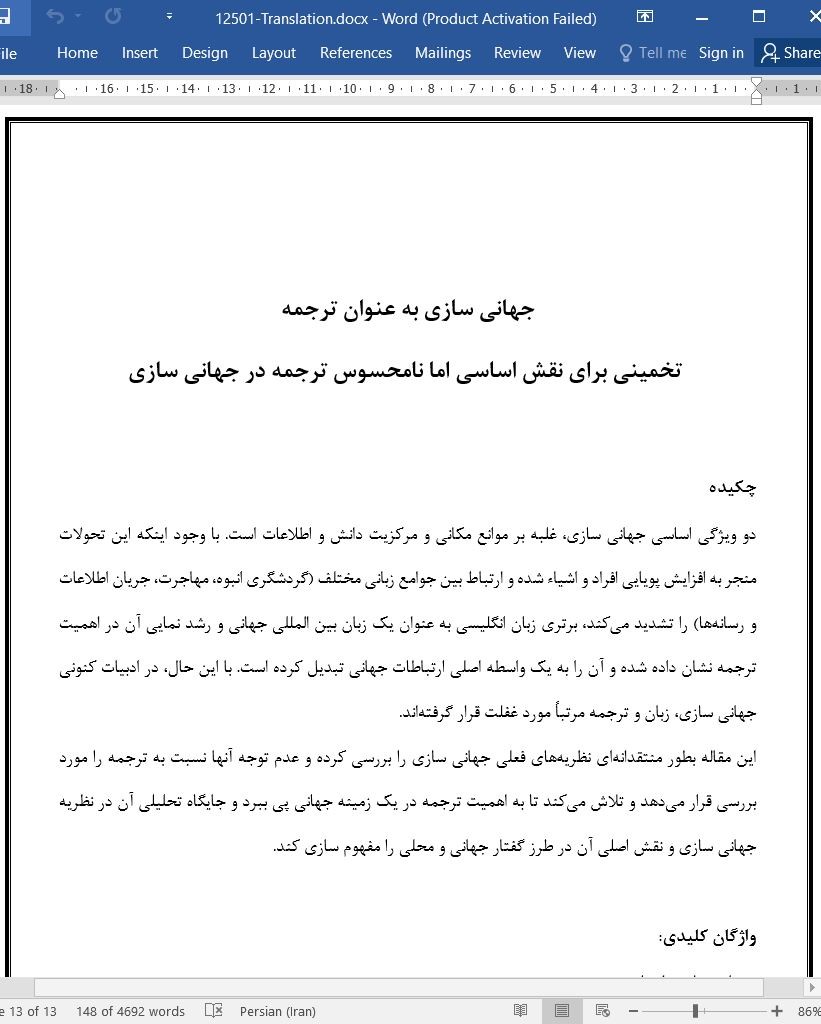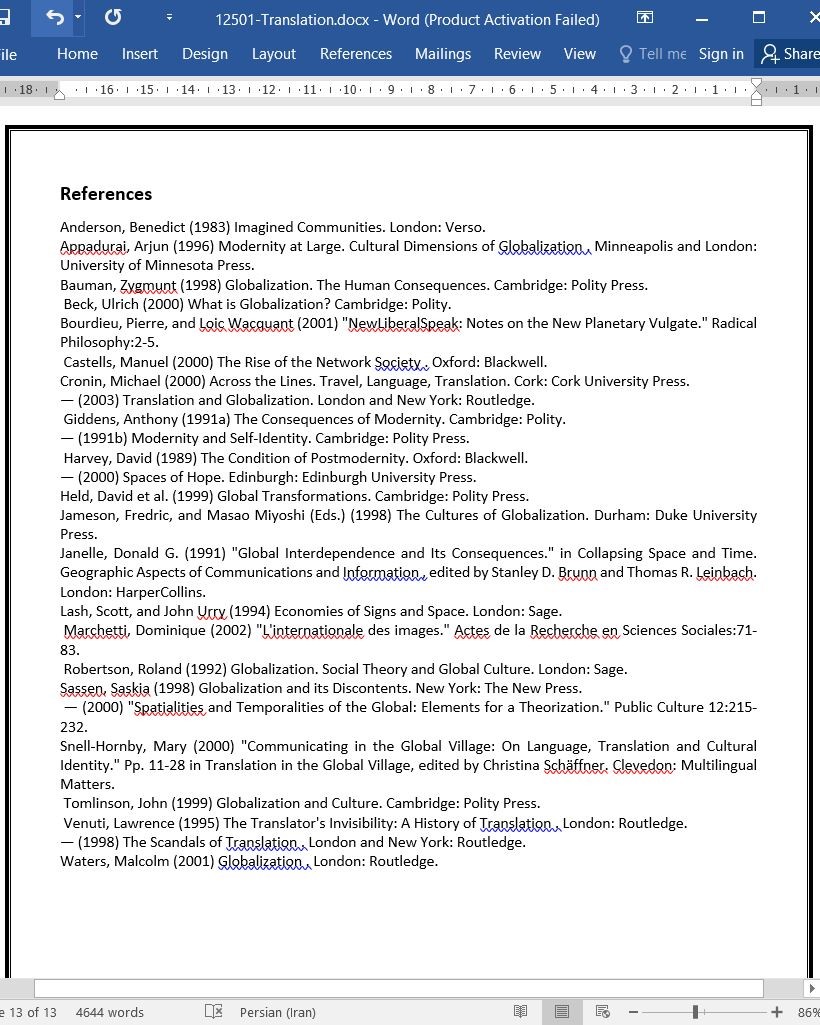
دانلود مقاله جهانی سازی به عنوان ترجمه
چکیده
دو ویژگی اساسی جهانی سازی، غلبه بر موانع مکانی و مرکزیت دانش و اطلاعات است. با وجود اینکه این تحولات منجر به افزایش پویایی افراد و اشیاء شده و ارتباط بین جوامع زبانی مختلف (گردشگری انبوه، مهاجرت، جریان اطلاعات و رسانهها) را تشدید میکند، برتری زبان انگلیسی به عنوان یک زبان بین المللی جهانی و رشد نمایی آن در اهمیت ترجمه نشان داده شده و آن را به یک واسطه اصلی ارتباطات جهانی تبدیل کرده است. با این حال، در ادبیات کنونی جهانی سازی، زبان و ترجمه مرتباً مورد غفلت قرار گرفتهاند.
این مقاله بطور منتقدانهای نظریههای فعلی جهانی سازی را بررسی کرده و عدم توجه آنها نسبت به ترجمه را مورد بررسی قرار میدهد و تلاش میکند تا به اهمیت ترجمه در یک زمینه جهانی پی ببرد و جایگاه تحلیلی آن در نظریه جهانی سازی و نقش اصلی آن در طرز گفتار جهانی و محلی را مفهوم سازی کند.
جهانی سازی به طور کلی با کوچک شدن دنیای ما و امکان برقراری ارتباط فوری در سرتاسر جهان همراه است بطوریکه استعارههای گستردهای از شتاب پویایی مانند تسریع جریانها و شاهراههای اطلاعاتی بر آن تأکید کردهاند و تصویری از جهان را به صورت شبکهای از مکانهای کاملاً بهم پیوسته که فضا بر آن غالب است، ایجاد نمودهاند. این مقاله تلاش میکند تا نشان دهد كه چگونه تمرکز كنونی جهانی سازی ناشی از پویایی، پیچیدگیهای شامل در غلبه بر موانع فرهنگی و زبانی را تحت تأثیر قرار داده و نقش ترجمه در ارتباطات جهانی را نامحسوس کرده است. در این مقاله استدلال میشود که ترجمه برای درک شرایط مادی که ارتباطات جهانی را ممکن میسازند یک امر اساسی است و تمرکز بر ترجمه پیامدهای مهمی را برای درک جهانی سازی به همراه دارد.
نتیجه گیری
گزارشات جهانی سازی عمدتاً بر افزایش ظرفیت ارتباط فوری در سراسر جهان تمرکز کردهاند و پیش شرطهای لازم برای دستیابی به آن را نادیده گرفتهاند. نقش بسیار مهمی که ترجمه در تولید و انتشار جریان اطلاعات جهانی ایفا میکند، نامحسوس و شفاف بوده ، و این امر منجر به این فرض شده است که اطلاعات میتوانند بدون تغییر در سراسر جوامع و فرهنگهای مختلف زبانی انتشار یابند. تجزیه و تحلیل ترجمه به عنوان یک زیرساخت مهم جهانی سازی، روشی را برای بررسی طرز گفتار بین حوزههای جهانی و محلی در سطح واقعی و اصولی ارائه میدهد. بخصوص، این امر به ما امکان میدهد تا چگونگی مذاکره در مورد تفاوتهای فرهنگی در جهانی سازی و چگونگی میانجی گری روند فعلی نسبت به همگن سازی فرهنگی و توفق انگلو-آمریکایی از طریق استراتژیهای بومی سازی و ترکیبی در سطح محلی را مفهوم سازی کرده و بطور تجربی ارزیابی کنیم.
Abstract
Two fundamental features of globalisation are the overcoming of spatial barriers and the centrality of knowledge and information. These developments, which result in the increased mobility of people and objects and a heightened contact between different linguistic communities (mass tourism, migration, information and media flows) signal, in spite of the predominance of English as a global lingua franca, an exponential growth in the significance of translation, which becomes a key mediator of global communication. Yet language and translation have been systematically neglected in the current literature on globalisation.
This article critically examines current theories of globalisation and interrogates their lack of attention towards translation. It formulates an attempt to understand the significance of translation in a global context, conceptualising its analytical place in globalisation theory and its key role in the articulation of the global and the local.
Globalisation is generally associated with the shrinking of our world and the possibility of instant communication across the globe, as is emphasised by widespread metaphors of accelerated mobility, such as those of flows and of the information superhighway, which create an image of the world as a network of highly interconnected places in which space is overcome. This article will endeavour to show how the present focus of globalisation the ory on mobility has obscured the complexities involved in overcoming cultural and linguistic barriers, and made the role of translation in global communications invisible. It will argue that translation is central for an understanding of the material conditions that make possible global connectedness and that a focus on translation has important consequences for the way that globalisation is understood.
Conclusion
Accounts of globalisation have primarily focused on the increased capacity for instant communication worldwide, ignoring the necessary preconditions for achieving it. The increasingly important role played by translation in the production and circulation of global information flows has been made invisible and transparent, and this has lead to the assumption that information can circulate unaltered across different linguistic communities and cultures. An analysis of translation as a key infrastructure of globalisation offers a way of exploring the articulation between the global and the local on a concrete, material level. In particular, it allows us to conceptualise and empirically assess how cultural difference is negotiated under globalisation and how present trends towards cultural homogenisation and Anglo-American domination are mediated at the local level through strategies of domestification and hybridisation.
چکیده
جایگاه تحلیلی ترجمه در جهانی سازی
جهانی سازی به عنوان ترجمه
نتیجه گیری
منابع
Abstract
The analytical place of translation in globalization
Globalisation as translation
Conclusion
References
- اصل مقاله انگلیسی با فرمت ورد (word) با قابلیت ویرایش
- ترجمه فارسی مقاله با فرمت ورد (word) با قابلیت ویرایش، بدون آرم سایت ای ترجمه
- ترجمه فارسی مقاله با فرمت pdf، بدون آرم سایت ای ترجمه


